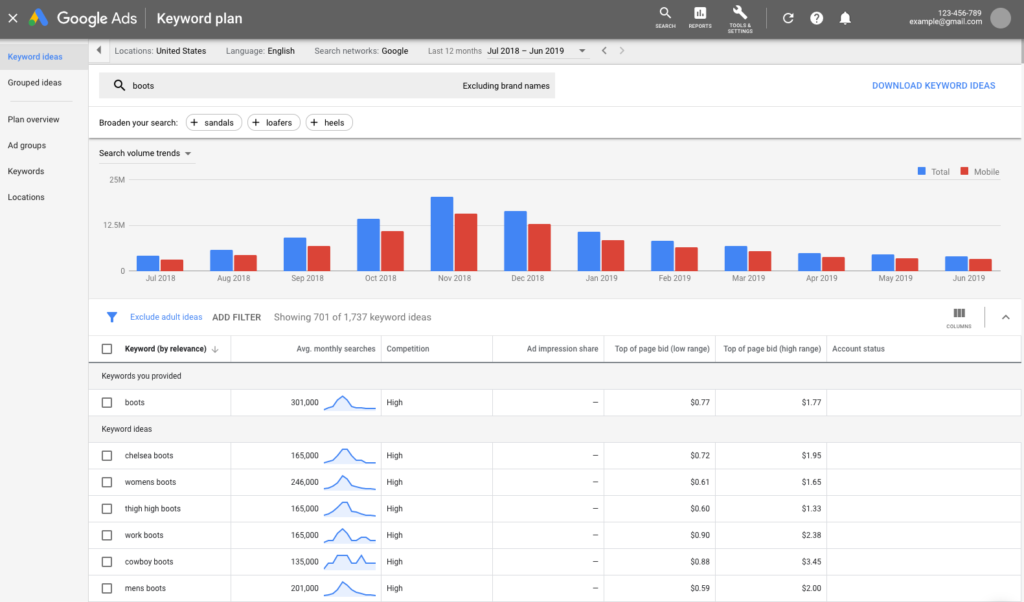
Table of Contents
- What Is a Standard Budget For SEO?
- Why Do You Need to Make an SEO Budget?
- How to Create an SEO budget?
- Key Takeaways
- Conclusion
- FAQs
When you plan your search engine optimization (SEO) strategy, it’s important to have an SEO budget put in place. This is important because SEO is not cheap at all. While planning your SEO, it’s also important to set aside a budget before getting started. Most businesses’ SEO strategies and efforts suffer because they fail to set aside a good budget for SEO or plan their best practices accordingly.
What Is a Standard Budget For SEO?

There is no standard budget for SEO as each business has its own needs and requirements. The best you can do is plan your SEO budget according to your business revenues and priorities once you evaluate your business SEO goals.
So, if you’re working with a good SEO agency, then you’ll first start with a consultation to help establish your business SEO goals. However, if you’re planning to do your SEO in-house, you need to spend time making sure that you are budgeting for all the below five SEO pillars.
- SEO Audits: This includes SEO content audits, technical site audits, and backlink audits.
- Keyword Research: This is important to help your business SEO strategy direction.
- On-Page SEO: This type of SEO includes anchor text optimization and link building.
- SEO Content: Optimized to help show authority and rank higher in search.
- SEO Reporting & Analytics: A vital part of your optimization efforts.
Why Do You Need to Make an SEO budget?

Many businesses mistake planning their SEO strategy without a budget for SEO in mind, but this can cause them major setbacks. Like any other marketing strategy, you must plan your budget well before beginning SEO marketing. Here are a few reasons why you need to make an SEO budget:
- It helps you stay focused without worrying about your finances.
- With a budget in place, you know what to focus on, like proper web content writing for SEO, rather than focusing on anything and everything, which may sometimes be a waste of money.
How to Create an SEO Budget?

Before planning your search engine marketing budget, there are some important things to keep in mind before diving into the SEO budget.
SEO is a long-term strategy
Every business is different, but it would usually take around four to six months for results to show and another six to 12 months to notice satisfying results. Rarely would you see results within a couple of months.
This is primarily because the first few months have a lot of planning, discovery, and auditing. The second month sees the start of its implementation, but it would take some time for the search engines to recognize these changes. So, nothing happens in terms of results until the end of the second month.
However, when you notice results appearing in the third and fourth months, it’s going to be minimal. By the fifth or sixth month, you would notice things starting to move and improve, but it would take close to 12 months before the payoff starts.
SEO isn’t cheap

Before planning your budget for SEO, you must understand that SEO isn’t cheap. So, if you are hiring a good SEO firm to help provide your business with a comprehensive SEO service, then be prepared to shell out a minimum of $3,000 to $5,000 every month.
Many companies are spending around $10,000 per month on SEO. If you’re serious about your SEO strategies or focus on other aspects of the business, consider hiring a good SEO company to look after your SEO needs.
Now that you’ve understood the SEO marketing costs and the actual time taken for real results let’s dive into the different steps for planning your budget for SEO.
Analyze your digital marketing budget as a whole
It’s essential first to take a look and analyze your existing digital marketing budget. This can help determine the percentage you can keep aside for your SEO marketing alone.
Now, let’s say that your existing digital marketing budget looks something like this:
- 30% Google Ads
- 20% Social Media Ads
- 20% Email
- 20% Referral Traffic
- 10% Organic Traffic (SEO)
You then need to look at the channels that are generating less ROI. Let’s say, for example, referral traffic and email marketing aren’t doing great, so you can simply add 10% from each and add it to your SEO budget. Though Google Ads are important, SEO will generate more organic traffic in the long run, so taking 10% from the Google Ads budget and giving it to SEO is a good idea.
Now your digital marketing budget will look like this:
- 20% Google Ads
- 20% Social Media Ads
- 10% Email
- 10% Referral Traffic
- 30% Organic Traffic
If you know which marketing efforts generate a low ROI, then giving more to your SEO budget will always prove to be a better option. Keep in mind that SEO will always generate more ROI in the long run when compared to any other marketing effort if done right.
Optimize your business SEO budget according to the 70-20-10 rule

Once you’ve determined that 30% of the marketing budget should be assigned for SEO, you can then look at the different SEO areas to allocate the budget accordingly. The 70-20-10 rule is the best to allocate your funds for your SEO marketing budget. Let’s break this down.
Optimizing for now
70% of your business’s SEO budget must be spent on optimizing your current working aspects to drive better business results. You can update your old blog posts to improve your content or page speed. This helps to make your website perform better in search results. Increasing the user experience on both – mobile and desktop helps to eliminate any technical issues that users may be facing.
Optimizing for next
Today, many SEO experts will agree that certain trends are running strong while others are fading out. Some trends you must focus on are original content, keywords research, voice search, artificial intelligence, video marketing, and influencer SEO.
Optimizing for new
Google is always trying to find new ways to optimize search. Hence, you must make your content accessible to all. Your “Google My Business” account can be updated to include business hours, images, product descriptions, etc.
Compare your SEO budget to your pay-per-click budget
One of the major benefits of Google Ads is that it gives quick results. It’s perfect for businesses that are looking to get traffic quickly. However, Google Ads can be tricky – the system may be easy to use, but if you do not know how to run Ad campaigns well, you may land up spending more than you gain.
Google Ads are very much a part of your marketing best practices. But in the first month of your ads launching, you should start your SEO. So, in the long-term, you will have to invest less in SEO, and it will also give you more annual revenue, local traffic, and a better online presence.
Focus on your content marketing
It’s challenging to get organic traffic to your sales pages, and it’s also rare to find product pages on the first page of the search unless it’s a paid advertisement. So, one of the best strategies is to focus on your content creation to drive traffic to your products. Here are a few ways to do this:
Internal linking
Let’s say, for instance, you have four product pages that you’d like to generate more revenue from. Since it’s difficult for product pages to rank in search naturally, you’ll want to create articles focusing on persuading the audience into considering those products. Product reviews and how-to articles are the perfect content for internal linking.
Guest blogging
This is one of the best ways if you’re looking to get inbound links from other websites. Bloggers are always looking for guest posts because they give their website a new perspective with fresh content.
Get links from manufacturers
Another amazing strategy that won’t waste your SEO budget is getting your manufacturer’s backlinks. Your manufacturers can easily include links on their store locator or directory page.
Product reviews from influencers and bloggers
Though this marketing strategy can cost you some money, it’s a great tool for content marketing, depending on the influencer and the audience size.
Create infographics
Using infographics is another excellent strategy when it comes to your budget for SEO. It comes with a high SEO impact and acts as easily digestible content that your readers would love.
Don’t forget your keyword research tool

Another critical part of planning your budget for SEO is to use proper keyword research tools to find the right keywords for your business. This is crucial if you’re looking to see ROI results. You can get a general idea of profitable keywords even with free tools. Using the Google Keyword Planner, you can see:
- Keyword search volume
- Relevant keywords that you can use in your marketing content
- How many advertisers are ready to pay per click
- Keyword performance in various locations.

Key Takeaways
- SEO is a long-term strategy. It would usually take around four to six months for results to show and another six to 12 months to notice satisfying results.
- Everything related to planning and executing SEO is expensive.
- Analyze your digital marketing budget as a whole and decide how much you would like to set aside for your budget for SEO.
- Optimize your business SEO budget according to the 70-20-10 rule.
- Google Ads gives you fast results. It’s perfect for companies looking to get traffic quickly.
- Focus on content marketing that helps to drive traffic.
Becoming a Pro at SEO Budgeting
There are many different ways to plan your budget for SEO. It’s possible to develop a robust strategy at a great price if you decide to do most of your SEO work in-house. Many businesses begin this way, and once they gain experience or grow, they become an SEO expert themselves or work with other professionals to plan their SEO strategies.

FAQs
Most businesses suffer because they fail to keep aside a proper budget for SEO. Planning a budget for SEO in advance will help you stay organized.
Every business has its requirements, so there is no standard SEO budget. Hence, it’s essential to plan your budget according to your priorities, revenues, and goals.
SEO isn’t cheap. If you hire a good SEO firm to help provide your business with a comprehensive SEO service, be prepared to shell out a minimum of $3,000 to $5,000 every month.
The 70-20-10 rule is to optimize, for now, next and new. So, you break up your SEO budget into three parts. 70% should be kept aside for improving your website performance, 20% for new technologies and trends, and 10% for making your content accessible for all by including high-quality images, product descriptions, etc.
Internal linking, guest blogging, product reviews by influencers, backlinking by manufacturers, and creating infographics are a few content marketing strategies to focus on.
Latest Blogs
Explore how Google’s 2025 AI search updates triggered ranking chaos. Learn actionable strategies to adapt your SEO for AI Overviews, zero-click searches, and SERP volatility. Stay ahead now.
Learn how to rank on AI search engines like ChatGPT, Perplexity, and Gemini by optimizing your content for authority, structure, and relevance. Stay ahead in AI-driven search with this strategic guide.
Explore the best healthcare SEO services for your medical practice. Improve online visibility and effectively reach more patients in need of your services.
Get your hands on the latest news!
Similar Posts

Artificial Intelligence
6 mins read
The Role of AI in Digital Marketing: AI Article Generators Transforming Content Creation

Artificial Intelligence
4 mins read
How AI Content Creator Is Shaping the Future of Digital Content

Digital Marketing
3 mins read